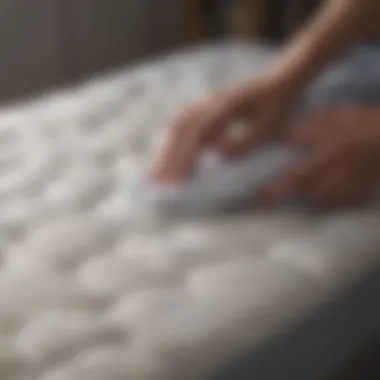Exploring the Benefits of Mattress Toppers for Better Sleep


Intro
In recent years, the importance of sleep has garnered significant attention. It is widely accepted that quality sleep is crucial for overall well-being. As such, many individuals are exploring various options to improve their sleeping experience. One popular solution is investing in a mattress topper. This article aims to explore the numerous benefits that mattress toppers offer, while also examining the different styles and materials available in the market. Understanding mattress toppers can help consumers make informed choices tailored to their sleep needs.
Mattress toppers act as an additional layer placed on top of a mattress, enhancing comfort and support. They serve to improve the sleeping surface without requiring a complete mattress replacement. This flexibility makes them appealing to various consumers, from those looking to upgrade their existing mattress to individuals seeking relief from specific sleep-related issues.
The discussion will highlight the materials commonly used in mattress toppers, such as memory foam, latex, and feather options. While these materials each bring unique attributes, factors such as durability, support, and price should influence consumer decisions. In addition, this article will address how different overturns can cater to specific sleep requirements, enhancing the overall sleep quality.
By the end of this article, readers will have a comprehensive understanding of:
- The fundamental characteristics of mattress toppers
- The pros and cons of various mattress topper materials
- Ideal choices for different sleep positions
- Maintenance tips to ensure longevity and performance
Overall, this narrative will provide valuable insights into how mattress toppers can transform sleeping arrangements, bringing more comfort and quality to every night's sleep.
Foreword to Mattress Toppers
The modern sleeping experience is influenced greatly by factors such as comfort, support, and personal preference. One item that has gained popularity in enhancing these aspects is the mattress topper. Understanding what mattress toppers are, as well as their purpose, is crucial for anyone seeking to improve their sleep quality.
Mattress toppers serve as an additional layer placed on top of an existing mattress. They are designed to modify the surface feel of the mattress, making it softer or firmer depending on the user's preference. Additionally, they can add some level of protection for the mattress itself, which can prolong its life and enhance hygiene. With countless options available on the market, knowledge of mattress toppers can lead to informed purchasing choices tailored to one’s needs.
Definition and Purpose
A mattress topper is often made from various materials and varies in thickness. Their principal purpose is to improve comfort and offer a customized sleeping experience. Depending on the material, a mattress topper can provide additional support for body alignment and pressure relief, which can significantly affect sleep quality.
Toppers are particularly beneficial for individuals with specific discomforts, like back pain or those who are sensitive to allergens. They can also cater to personal temperature preferences, as some materials are better for heat regulation than others. Overall, a mattress topper can drastically transform a solid mattress into a more inviting surface, making sleep feel more restorative.
Types of Mattress Toppers
Understanding the different types of mattress toppers is essential for anyone looking to enhance their sleep experience. Each type offers distinct benefits and is made from various materials, determining its comfort, support, and durability. Knowing the nuances of each mattress topper can help consumers make an informed choice that aligns with their personal needs and preferences. As we explore these categories, we will look into their key features, advantages, and considerations when selecting the right topper for your mattress.
Memory Foam Toppers
Memory foam toppers are popular for their ability to conform to the body’s shape. This material is designed to provide pressure relief, making it an excellent option for individuals with joint discomfort or back pain.
Key features include:
- Excellent contouring properties
- Variable thickness options for added customization
- Generally good motion isolation, helpful for couples who may disturb each other’s sleep
It is important to consider, however, that memory foam can retain heat, which may not be ideal for people who tend to sleep hot. Seek out options with cooling gel infusion or open-cell structures for enhanced breathability.
Latex Toppers
Latex toppers made from natural or synthetic latex offer a resilient comfort choice. Latex has an inherent bounce, providing good support while still allowing for some contouring.
Advantages include:
- Durability and longevity, often outlasting other materials
- Breathable structure helping with temperature regulation
- Naturally hypoallergenic and resistant to dust mites and mold
However, latex can be heavier than other types of toppers, and some may find it too firm without additional cushioning.
Feather and Down Toppers
Feather and down toppers bring a luxurious touch to bedding. They are filled with natural materials like goose or duck down.


Benefits are:
- Soft and plush feel, providing a cozy sleeping surface
- Lightweight and easy to compress for storage
- Good for those who prefer a more traditional, cushioned feel as opposed to firmer support
On the downside, allergen sensitivity can be a consideration, as these materials may trigger reactions for some individuals. Regular fluffing and careful cleaning are essential to maintain their loft and support.
Polyester and Fiberfill Toppers
Polyster and fiberfill toppers are often cost-effective alternatives. They are made from synthetic fibers, offering a soft and potentially hypoallergenic surface.
Key points include:
- Lower price point compared to other types
- Lightweight and easy to handle
- Ease of maintenance, as they are generally machine washable
However, these toppers may compress over time and may not offer the same level of support or durability as memory foam or latex options. They are best suited for those looking for temporary comfort solutions rather than long-term investments.
Gel-infused Toppers
Gel-infused toppers combine the benefits of memory foam with cooling properties. The gel infusion helps regulate temperature, making them an appealing option for hot sleepers.
Important features are:
- The cooling effect helps maintain a comfortable sleeping temperature
- Good support with contouring similar to traditional memory foam
- Provides pressure relief for those with discomfort in certain areas
Nevertheless, the longevity and durability can depend on the quality of the materials used, so it's important to research brands carefully before purchasing.
Benefits of Using a Mattress Topper
The importance of mattress toppers lies in their ability to provide additional layers of comfort and support, which enhances the overall sleeping experience. As more people become aware of the impact sleep quality has on their health and daily life, choosing the right mattress topper can lead to a notable improvement. This section will examine key benefits such as comfort enhancement, sleep quality improvement, and protection for existing mattresses.
Enhanced Comfort
Comfort is a pivotal factor when it comes to quality sleep. A mattress topper can significantly alter how a mattress feels. Whether one prefers a firmer surface or something plusher, the right topper can deliver personalized comfort. A memory foam topper, for instance, conforms to the body, providing support where needed without causing undue pressure. This customization allows sleepers to feel cradled rather than trapped.
Moreover, many toppers serve as a temperature buffer. Materials like gel-infused foam can draw heat away from the body, making the surface cooler and more comfortable for those who tend to sleep warm. The immediate effect of improved comfort can make falling asleep easier and staying asleep more manageable, directly correlating to better rest.
Improved Sleep Quality
Scientific studies emphasize the importance of quality sleep, which can influence mental clarity and mood. A mattress topper plays an integral role in achieving this goal by addressing specific discomforts. When a person chooses a topper that aligns with their sleeping style, they may find a reduction in disturbances caused by tossing and turning due to discomfort or poor spinal alignment.
For example, side sleepers may benefit from softer toppers that allow the shoulders and hips to sink in, helping maintain proper spine alignment. This small change can significantly improve sleep quality, leading to a refreshing morning.
"A good night's sleep is vital for good health."
Furthermore, the pressure relief provided by many toppers helps in reducing the risk of developing pressure sores, making it a valuable tool for specific health needs.
Protection for the Mattress
Investing in a quality mattress can be costly. A mattress topper acts as a safeguard against wear and tear. It protects the existing mattress from moisture and spills, thus extending its lifespan. Most toppers are easily removable and washable, making it simpler to keep bedding clean.
By placing a topper on top, the original mattress remains in a better condition for a longer period. When it comes time to replace the mattress, having a topper can reduce the need to invest in a new one right away, as the underlying mattress remains in good shape, resulting in potential cost savings.
Additionally, some toppers are designed for added benefits such as hypoallergenic properties, benefiting those who suffer from allergies. By using a hypoallergenic mattress topper, one can help in creating a cleaner sleep environment.
In summary, the benefits of using a mattress topper are manifold. From enhancing comfort and improving sleep quality to offering protection for the mattress, selecting the right topper can make a substantial difference in one's sleep experience. With an understanding of these advantages, homeowners and design enthusiasts can make informed decisions for their sleep environments.


Factors to Consider When Choosing a Mattress Topper
Selecting the right mattress topper requires careful consideration of various factors. These elements directly influence comfort, support, and the overall quality of sleep one can expect. When evaluating options, it is important to think about how each feature will interact with your personal sleep preferences and needs. A well-chosen mattress topper can significantly enhance sleep quality, prolong the life of your mattress, and even address specific health concerns.
Material Composition
The material of a mattress topper plays a crucial role in its overall performance. Different materials offer varying levels of support, comfort, and temperature regulation. Common materials include memory foam, latex, and down alternatives.
- Memory Foam: Known for its ability to conform to the body, it provides pressure relief and support for the spine.
- Latex: Offers a more responsive feel and can be great for those who prefer a little bounce. It also has natural temperature-regulating properties.
- Down or Feather: Provide a plush feel but might not offer the same level of support as foam or latex.
- Polyester and Fiberfill: Generally more budget-friendly, but their durability and support can vary.
Choosing the right composition relates directly to individual needs. For instance, a person with back issues might favor memory foam, while someone who sleeps hot might lean toward latex.
Thickness
Thickness is another important factor to consider. Mattress toppers usually range from 1 to 4 inches in thickness. Thicker options typically provide more cushioning and support, but they can also elevate the sleeper's position on the bed. Adequate thickness will depend on the specific needs of the user:
- 1-2 Inches: Suitable for minor comfort adjustments.
- 3-4 Inches: Better option for significant changes in support or comfort level. This thickness can help align the spine effectively, especially for side sleepers.
Keep in mind that too thick of a topper can lead to stability issues. Ensure the thickness aligns with your existing mattress' firmness and comfort level.
Density and Firmness
The density and firmness of the mattress topper should not be overlooked. Density affects durability and support. Higher density foam tends to last longer and offers better support but can also feel firmer. Conversely, lower-density options might feel softer but could wear out quicker.
Additionally, firmness is subjective. Some users prefer a soft, plush sleeping surface while others seek a firmer base for support. Testing various firmness levels can be beneficial to determine what feels best for your body. A supportive mattress topper adapts to your unique sleeping posture and distributes weight evenly.
Temperature Regulation
Temperature regulation is crucial for comfortable sleep. Certain materials retain heat, which can disturb sleep quality. Memory foam tends to trap heat, making it less ideal for hot sleepers. Conversely, latex has a cooler feel due to its natural properties and air circulation. Furthermore, gel-infused memory foam offers improved heat dispersion.
When considering temperature, assess your usual sleeping conditions. If you often wake up feeling hot, choosing a topper with better air circulation or cooling properties is essential. Look for indicators like "breathable fabrics" and "cooling technology" in the product description.
Choosing the right mattress topper is a multidimensional process. Each factor—material composition, thickness, density, firmness, and temperature regulation—will influence your overall sleeping experience. Understanding these elements allows for informed decisions that cater to specific sleep needs.
Specialized Mattress Toppers for Specific Needs
In the realm of sleep enhancement, specialized mattress toppers serve a crucial purpose. When conventional options do not meet unique individual requirements, these tailored solutions can provide specific benefits. People experience a range of sleep challenges. Whether it is chronic back pain, allergies, temperature regulation, or sleeping position, the right mattress topper can address these concerns. Choosing the appropriate topper can lead to improved comfort, better sleep quality, and overall satisfaction.
Toppers for Back Pain
Back pain is prevalent for many individuals, especially among those with specific sleeping positions or pre-existing conditions. A suitable mattress topper designed for back pain often features materials that provide support while still allowing for some give. Typically, memory foam is favored in this context. It contours to the shape of the body, offering targeted relief for pressure points.
Research indicates that sleeping on a supportive surface can alleviate discomfort. For a back pain specific topper, look for options that evaluate firmness levels. This will influence overall support and comfort.
Toppers for Allergies
Individuals suffering from allergies might find conventional bedding unsuitable. Dust mites and allergens can thrive in standard mattresses. Therefore, choosing a hypoallergenic mattress topper is essential. Latex toppers are known for their natural resistance to dust mites and mold, making them an excellent option for allergy sufferers.
Also consider toppers with removable and washable covers to simplify cleaning. Maintaining a high level of cleanliness can reduce allergy symptoms, leading to a more restful night.
Toppers for Hot Sleepers
For those who tend to overheat at night, the mattress material plays an important role. Hot sleepers benefit from toppers that allow for air circulation and heat dispersion. Gel-infused memory foam toppers are popular in this category. They provide the comfort and support of memory foam while also offering a cooler sleep surface.


It is advisable to choose a topper rated for temperature regulation. Materials designed specifically for cooling can make a significant difference in sleep quality for those who struggle with overheating.
Toppers for Side Sleepers
Side sleepers require a specific level of cushioning to ensure proper spine alignment and alleviate pressure on the shoulders and hips. A softer mattress topper often works best for these individuals. Memory foam or latex toppers can be beneficial here. They offer responsiveness to the body's contours, ensuring that the sleeper remains properly aligned.
When selecting a topper, consider options that provide adequate support without being too firm. A medium to soft feel typically works well for side sleepers, resulting in added comfort and reduced pain in critical areas.
Maintaining Your Mattress Topper
Proper maintenance of your mattress topper is essential for extending its lifespan and ensuring it continues to provide comfort and support. A well-maintained topper can significantly enhance the longevity of your mattress beneath it, while also contributing to better sleep quality. Neglecting to care for it, however, may lead to the buildup of allergens, odors, and deterioration of material quality. Therefore, understanding the advisable cleaning methods and knowing when to replace your mattress topper is critical for enjoying its benefits.
Cleaning and Care Guidelines
Cleaning your mattress topper is vital in maintaining its freshness and functionality. Most toppers require specific attention depending on their material. Here are a few general guidelines for effective cleaning:
- Regularly Vacuum: Use a hand-held vacuum or an attachment on your regular vacuum cleaner to remove dust and allergen buildup. This should be done at least once a month.
- Spot Clean Stains: For stains, use a mild detergent mixed with water. Apply it with a clean cloth and avoid soaking. For specific materials like memory foam, it is essential to use minimal water to prevent damage.
- Air it Out: Allow your topper to air out regularly by placing it outside on a dry day. Fresh air helps eliminate odors and moisture.
- Use a Protector: Consider investing in a mattress topper cover that is removable and washable. This provides an extra layer of protection against spills and dirt.
- Follow Manufacturer Instructions: Always refer to the specific care instructions provided with your topper. Different materials may have unique requirements.
Following these guidelines ensures that your mattress topper remains clean, hygienic, and comfortable.
When to Replace
Knowing when to replace your mattress topper is crucial for maintaining optimal sleep quality. Over time, even the best toppers can degrade in comfort and support. Here are some indicators that it may be time for a replacement:
- Visible Damage: Look for tears, lumps, or indentation that don’t bounce back. This structural damage can affect your comfort.
- Persistent Odors: If your mattress topper continues to hold onto smells even after cleaning, it may be time to replace it.
- Allergy Symptoms: Increased allergy symptoms can be a sign that your topper has accumulated dust mites or other allergens and may need replacement.
- Reduced Comfort: If you find yourself waking up with aches and pains, it might be a sign that your topper is no longer providing adequate support.
Regular maintenance and timely replacement are key to maximizing the benefits of mattress toppers.
Comparing Mattress Toppers
When considering the addition of a mattress topper, it is essential for consumers to understand the distinct variations available in the market. Comparing different types of mattress toppers allows homeowners and sleep enthusiasts to identify the ideal product that aligns with their personal comfort preferences and requirements. This section will delve into critical aspects including price range, quality, and user feedback, each of which can significantly influence the decision-making process.
Price Range and Quality
The price of mattress toppers can vary dramatically based on material, brand, and even thickness. Entry-level options may start around $50, while high-end models can exceed $500. It is important to balance cost with quality. While a lower price may be appealing, it can compromise durability or comfort. As a result, understanding where a product falls on the pricing spectrum can help determine its overall value.
- Memory Foam Toppers: These typically range from $100 to $300, depending on density and thickness.
- Latex Toppers: Generally more expensive, often costing between $200 and $500 but providing excellent durability.
- Feather and Down Toppers: Prices vary widely based on fill quality, ranging from $75 to $250.
Consumers should not overlook the long-term investment aspect. A higher price may yield a longer-lasting product that offers better sleep quality over time.
User Reviews and Recommendations
User reviews present a practical insight into the performance of different mattress toppers. Feedback from those who have used the products provides invaluable information.
"Understanding user experiences can reveal comfort levels, durability, and overall satisfaction. Potential buyers should prioritize reviews that highlight the specific factors that matter most to them, such as firmness, temperature regulation, and support for specific needs."
- Seek platforms: Websites like Reddit and dedicated mattress review sites are rich resources for diverse opinions.
- Look for trends: If multiple users consistently mention similar pros or cons about a particular topper, this trend can indicate its reliability and effectiveness.
Closure
In this article, the importance of mattress toppers has been thoroughly examined. These products provide significant benefits for those looking to enhance their sleep experience. A quality mattress topper can improve comfort, protect the mattress, and cater to individual sleep requirements. The choice available in the market ensures that consumers can find options that meet their specific needs.
Final Thoughts on Mattress Toppers
Mattress toppers are an investment in better sleep. They can help alleviate discomfort for various sleep positions, reduce allergens, and regulate temperature.
- Enhancement of Comfort: A mattress topper adds a layer of softness or firmness. This is crucial for those who may find their current mattress insufficient for their needs.
- Protection: Regular use can extend the life of your mattress. Not only does it safeguard against wear, but it also preserves the hygiene of the main sleeping surface.
- Specialized Options: With different types available, options like memory foam or latex can target specific issues, such as back pain or allergies.
"A good night’s sleep can dramatically affect your health and productivity. Investing in a mattress topper is a simple way to enhance that experience."
When considering a purchase, factors such as material, thickness, and maintenance should all be examined closely. The benefits are clear, and they translate to not just better sleep but overall wellbeing.















